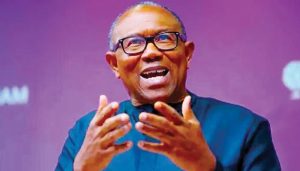By Ihechukwu Sunday
Senator representing Enugu North in the 10th Senate, Okey Ezea has said that rural development was capable of unlocking the nation’s wealth potential as well as growing the Gross Domestic products (GDP) by 30 percent in the next five years.
He, therefore, called on the Federal Government, as well as local and foreign investors to shift attention to opportunities in Nigeria’s rural areas to be able to tap the benefits.
Senator Ezea made this known at a forum in Nsukka, Enugu State, to inform his constituents about some of his constituency projects and his legislative agenda for the New Year.
He said intentional rural development could lift the country’s GDP from the current World Bank’s estimates of around $1.315 trillion to $2 trillion or more if the appropriate measures were taken to harvest the hidden wealth in rural communities.
Currently, the contribution of Nigeria’s rural population, which constitutes more than 45 percent of the country’s total population to the national GDP is estimated at 25 percent, but Ezea believes that with the right policy actions, the country would get a lot more from this segment of the population.
“When I speak of rural development, I do not want to be understood as referring to the urbanization of the rural areas. On the contrary, I am talking about the exploitation of the abundant economic opportunities in our rural communities, the creation of wealth through deliberate policy actions and redirection of investment opportunities.
“There is a lot we can gain from investing in the economic opportunities in our rural areas. Unfortunately, it appears the business community does not see the abundant opportunities, but investments in agriculture and its endless value chain are one area that is capable of taking millions of people out of poverty through job creation and birthing market opportunities where none existed,” he stated.
On how this can be done, the senator said a lot depends on the priorities of the government in providing enabling infrastructure and creating financial opportunities.
“One thing that governments at the federal, state, and local government areas should do is to be deliberate about the provision of infrastructure in the rural areas. Roads are important, so also are agricultural inputs. This is why in my constituency projects I am paying attention to the construction of rural farm roads, provision of fertilizers and other items that enhance farming. Our intervention is chiefly to point towards the direction of what we believe should be the area of greater national priorities, and that is why I believe the government at all tiers should shift attention to rural economic exploitation through the provision of access roads, potable water, and other tangible and intangible amenities,” he said.
He called on the government to creatively provide finance opportunities for small-scale investors in rural areas at friendly rates. This, he stressed, will ensure that productive capital gets to rural entrepreneurs, curtail migration, and “become the nectar that will draw the interest of bigger private sector investors that will be attracted by infrastructure, and availability of opportunities along the value chain, thus changing the economic fortunes of the country in five years or less.”
“If government at all levels becomes intentional about this, the 30 percent increase which I projected will likely be surpassed. Our traditional agriculture resources alone are enough to transform this economy if duly and profitably exploited. If we then exploit the various value chains of the crops we produce, like yams, cocoa, cassava, oil palm, and all the fruits and grains that thrive in many parts of this country, I do not see any reason we wouldn’t be globally competitive in food production in a few years,” he concluded.










More Stories
Obi prays for God to grant Soludo greater heights Chuks Eze The presidential candidate of the Labour Party (LP) in the 2023 general elections, Mr Peter Obi, has called on the Anambra State Governor, Chukwuma Soludo to show humility, gratitude and compassion, following what he described as an ‘unfortunate and bitter’ outburst by the governor. Speaking to journalists at the just-concluded Nigeria Guild of Editors meeting at the NAF Conference Center, Abuja, Obi congratulated Soludo for securing a second tenure and urged him to appreciate God’s mercies by responding to victory with grace rather than resentment. Obi’s remarks came after Soludo provoked controversy during his certificate-of-return ceremony, where he mocked his critics by calling Obi a ‘frustrated politician without a club’ and accused him of damaging the education system in Anambra. “I feel compelled to respond because if I do not, I will be accused of dodging the question,” Obi said, expressing surprise at Soludo’s remarks. “On an occasion meant to celebrate his certificate of return, instead of thanking Almighty God for granting him a second tenure; a moment to demonstrate love and magnanimity, he chose to show bitterness and resentment. It was deeply unfortunate.” Obi clarified his involvement in the recent Anambra election, saying, “I only attended three public events with the Labour Party candidate, strictly where I was invited. At none of these events did I mention anyone by name or meet with traditional rulers, market leaders or any other group to discuss candidates. There was nothing I said to warrant controversy or speculation,” he stressed. Reflecting on the Election Day, Obi recounted how he quietly fulfilled his civic duty, conscious of the weight of responsibility that comes with leadership. “I witnessed irregularities and disruptions that could have easily escalated into chaos,” he said. “When outsiders attempted to cast votes in our community, I stepped in and urged my people to remain calm and allow them to act peacefully. In that moment, I was reminded that integrity must always take precedence over politics. True leadership is measured, not by the contest for power, but by the courage to uphold fairness, restraint and the dignity of our people, even in the most trying circumstances.” Addressing Soludo’s mocking remarks, he used a vivid metaphor from football to clarify his perspective: “On the day of the election, journalists approached me as if I were on the ballot. I reminded them that I served as governor 13 years ago and have since moved on to a higher level in national politics. In football terms, if gubernatorial candidates are in the first division, I am in the Champions League. I ran for Vice President in 2019 and for President in 2023, winning 11 states and Abuja. I play well at that level, and my record speaks for itself.” He also reflected on his age and historic achievements in Anambra State. “In both the old and new Anambra, only Jim Nwobodo and I became governors in our 40s. I was the first to serve a second tenure. I have no personal issue with Governor Soludo. I pray that God grants him even greater heights, if that will inspire him to show humility, compassion and a genuine concern for the people,” he said. He concluded with an appeal, saying, “We must recognise the mercies God grants us. Leadership is not about resentment or bitterness; it is about service, gratitude, and love for our people.”
Kano: Yusuf assents to Law establishing Gaya Polytechnic
SDP NWC expels suspended national chairman, Gabam, 8 others